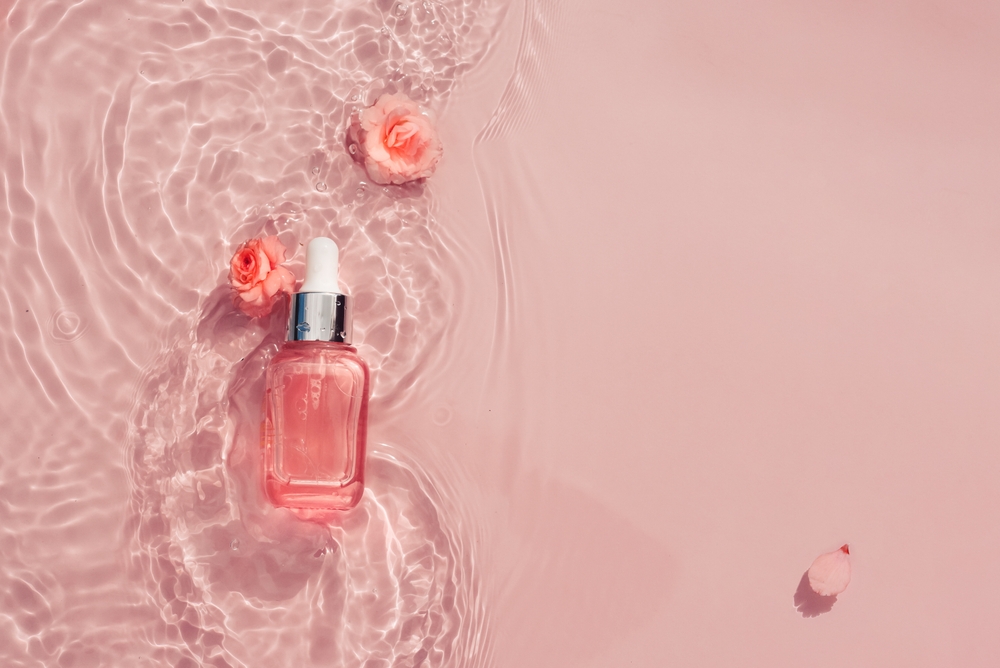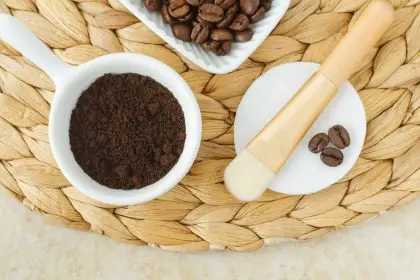That gorgeous bouquet sitting on your kitchen counter isn’t just eye candy. Those velvety petals might be hiding one of beauty’s most enduring secrets. Rose water has been the not-so-secret weapon of glowing complexions for centuries, long before fancy serums in dropper bottles promised miracle results at eye-watering prices.
From Cleopatra’s legendary beauty rituals to your grandmother’s simple skincare routine, this fragrant flower water has earned its place in the pantheon of timeless beauty ingredients. But what exactly makes this delicate liquid so special, and could it be the missing piece in your own wellness routine?
The magical transformation from petal to potion
Rose water begins its journey as nothing more than delicate petals, typically from the Damascus rose. These petals undergo a fascinating transformation through steam distillation, a process that’s remained largely unchanged for centuries.
As steam rises through the petals, it captures their essential oils and beneficial compounds. When this vapor cools and condenses, it separates into two treasures: rose water and the significantly more expensive rose oil. While modern manufacturing has industrialized this process, the fundamental technique would be recognizable to Persian alchemists from a thousand years ago.
The resulting liquid captures both the intoxicating fragrance and many beneficial properties of roses. What makes this process especially remarkable is its simplicity. No harsh chemicals or complex laboratory procedures are needed, just the ancient dance between water, heat, and flower.
Why your skin might be craving rose power
Your skin faces a daily barrage of environmental assaults, from pollution to harsh weather, not to mention the stress hormones your own body produces. Rose water offers a gentle counterbalance to these challenges through several pathways.
The natural gentle astringent properties of rose water help tighten pores and restore your skin’s pH balance after cleansing. This makes it an ideal toner for almost every skin type, from dry and sensitive to oily and acne-prone. Unlike alcohol-based toners that can strip your skin’s natural oils, rose water removes excess oil and impurities while maintaining your skin’s delicate moisture balance.
Its anti-inflammatory properties make it particularly soothing for irritated or sensitive skin. Applying rose water can help calm redness, reduce swelling, and ease discomfort from conditions like rosacea or eczema. Many people find that a simple rose water spray provides immediate relief from environmental irritants or sun exposure.
Perhaps most impressive is rose water’s reputation for fighting the visible signs of aging. Its antioxidant content helps neutralize free radicals, those unstable molecules that damage skin cells and accelerate the aging process. Regular use may help maintain skin elasticity and reduce the appearance of fine lines by supporting your skin’s natural regenerative processes.
Beyond beautiful skin: The surprising wellness benefits
While rose water is most famous for its skincare applications, its benefits extend far beyond the surface. The same properties that make it gentle yet effective for external use translate to several potential internal wellness applications.
Many people find the scent of roses profoundly calming, and this isn’t just a pleasant sensory experience. Inhaling rose fragrance appears to influence areas of the brain involved in emotional processing. A light mist of rose water on your pillow or a few drops added to a warm bath might help ease anxiety and promote better sleep during stressful periods.
Rose water’s gentle anti-inflammatory properties make it useful for soothing minor throat irritations. Gargling with diluted rose water can provide temporary relief from sore throats and mild mouth inflammations. The subtle antibacterial properties might offer additional benefits for oral health when used as part of your mouth care routine.
In traditional wellness systems like Ayurveda, rose water is considered cooling and balancing for the mind and body. It’s often recommended to help maintain emotional equilibrium during times of heat or emotional intensity. While these traditional uses haven’t been extensively studied by modern science, many people continue to find value in these ancient applications.
The culinary magic of flower water
Long before rose water became a beauty cabinet staple, it was a secret weapon in kitchens across North Africa, the Middle East, and South Asia. This fragrant water adds a distinctive floral note to both sweet and savory dishes without overwhelming other flavors.
In Middle Eastern cuisine, rose water transforms ordinary desserts into extraordinary experiences. A few drops elevate simple rice pudding into something special, while traditional treats like baklava and Turkish delight would be unrecognizable without their signature rose fragrance. The key is restraint—just enough to detect the floral notes without feeling like you’re eating perfume.
Beyond desserts, innovative cooks are rediscovering rose water’s versatility in crafting unique beverages. A splash in lemonade creates a sophisticated refreshment, while a few drops in cocktails can add an unexpected floral dimension. Even your morning yogurt can benefit from a light rose water drizzle paired with honey and pistachios.
What makes rose water particularly valuable in the kitchen is its ability to add complexity without additional calories or artificial ingredients. It’s an essence rather than a sweetener, bringing depth and character to dishes without altering their nutritional profile.
DIY rose magic: Creating your own floral elixir
While quality rose water is widely available for purchase, there’s something deeply satisfying about creating your own batch from fresh roses. The process connects you to an ancient tradition and ensures you know exactly what’s in your final product.
The simplest method requires nothing more than organic roses, distilled water, and a bit of patience. Begin by gathering roses that have been grown without pesticides or chemicals—roses from your own garden are ideal if available. Remove the petals carefully and rinse them gently to remove any dust or visitors.
Place the clean petals in a large pot and add just enough distilled water to cover them. Cover the pot with a lid and simmer on low heat for about 20-30 minutes until the petals lose their color. Allow the mixture to cool completely before straining it through a fine sieve or cheesecloth into a sterilized glass bottle.
For a more authentic distillation method, you’ll need an improvised still. Place a heat-safe bowl in the center of a large pot. Arrange rose petals around the bowl, not in it, and add enough water to cover the petals. Place a lid on the pot upside down so the handle points down toward the bowl. As the water simmers, steam will rise, condense on the inverted lid, and drip into the bowl as pure rose water.
Store your homemade rose water in the refrigerator and use it within 1-2 weeks, or add a preservative like alcohol or vitamin E if you want it to last longer. The fresh, authentic fragrance of homemade rose water often surprises people accustomed to commercial versions.
Integrating rose water into your daily routine
The beauty of rose water lies in its versatility and ease of use. Even the busiest lifestyle can accommodate this simple addition to daily wellness practices.
Keep a small spray bottle of rose water in your bag for midday refreshment. A quick mist can revive tired skin, set makeup, or provide a moment of aromatic calm during a hectic day. During travel, it’s particularly valuable for counteracting the dehydrating effects of airplane cabins or climate changes.
After cleansing, swap your regular toner for rose water applied with a cotton pad. The gentle astringent properties help remove any remaining impurities while balancing your skin’s pH. Follow with your usual moisturizer while your skin is still slightly damp for enhanced absorption.
For puffy eyes or skin irritation, soak cotton pads in chilled rose water and apply as a compress for 10-15 minutes. The cooling sensation combined with rose water’s anti-inflammatory properties provides immediate relief and visual improvement.
Finding quality rose water in a sea of options
Not all rose waters are created equal, and quality varies dramatically between products. The best rose water contains just two ingredients: roses and water. Avoid products with added fragrances, preservatives, or alcohol that can negate the gentle benefits.
Look for rose water packaged in dark glass bottles, which protect the delicate compounds from light degradation. Plastic containers may leach chemicals into the rose water over time, particularly in warm environments.
The production method also matters significantly. True steam-distilled rose water, sometimes labeled as rose hydrosol, offers the most therapeutic benefits. Products labeled as “rose flower water” often contain water mixed with synthetic fragrance or rose essential oil rather than being true distillates.
While pure rose water has a naturally subtle scent, an overpowering rose fragrance often indicates artificial additions. Authentic rose water should smell delicate and natural, not like a perfume counter.
Whether you’re seeking better skin, a moment of calm in a chaotic day, or a secret ingredient for your kitchen creations, rose water offers accessible luxury with roots stretching back through centuries of wellness wisdom. Perhaps there’s a reason this simple floral water has endured while countless trendy ingredients have faded into obscurity. Some beauty secrets truly are timeless.
















